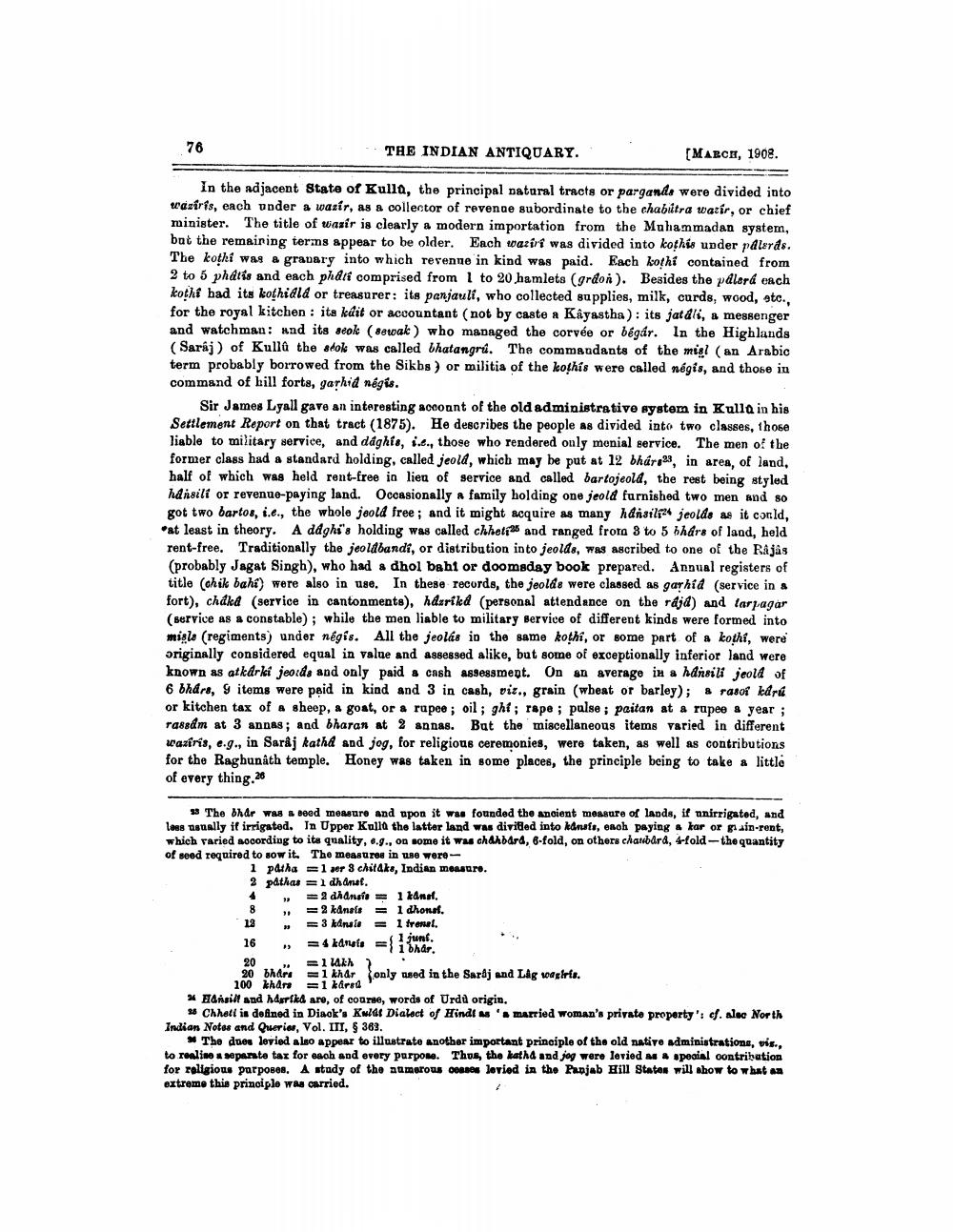________________
76
-THE INDIAN ANTIQUARY.
(MAECE, 1908.
In the adjacent State of Kulla, the principal patural tracts or pargands were divided into waziris, each under a wazír, as a collector of revenue subordinate to the chabitra watir, or chief minister. The title of wasir is clearly a modern importation from the Muhammadan system, but the remaining terms appear to be older. Each waziri was divided into koçhis under pdlerds. The kotki was a gravary into which rerenne in kind was paid. Each kothi contained from 2 to 5 phátis and each pháti comprised from 1 to 20 hamlets (grdon). Besides the pdlerá each Kothi had its kothidld or treasurer: its panjauli, who collected supplies, milk, curds, wood, etc., for the royal kitchen : ita káit or accountant (not by caste a Kayastha): its jatali, a messenger and watchman: and its seok (sewak) who managed the corvée or bégár. In the Highlands (Saraj) of Kulld the stok was called thatangrú. The commandants of the migl (an Arabic term probably borrowed from the Sikbs) or militia of the kothís were called négis, and those in command of hill forts, garhid négis.
Sir James Lyall gave an interesting account of the old administrative system in Kullo in his Settlement Report on that tract (1875). He describes the people as divided into two classes, those liable to military service, and dághís, ie, those who rendered only menial service. The men of the former class had a standard holding, called jeold, which may be put at 12 bhár 23, in area, of land, half of which was held rent-free in lieu of service and called bartojeold, the rest being styled hànsili or revenue-paying land. Occasionally a family holding one jeold furnished two men and so got two bartos, i.e., the whole jeold free ; and it might acquire as many hdnsila jeolds as it corld, *at least in theory. A ddghi's holding was called chheti and ranged from 3 to 5 bhárs of land, held rent-free. Traditionally the jeoldbandi, or distribution into jeolds, was ascribed to one of the Rajas (probably Jagat Singh), who had a dhol baht or doomsday book prepared. Annual registers of title (chik bahí) were also in use. In these records, the jeolds were classed as gashid (service in a fort), chdkd (service in cantonments), hdärikd (personal attendance on the rdja) and tarpagar (service as a constable); while the men liable to military service of different kinds were formed into mislo (regiments) under négís. All the jeolás in the same kothi, or some part of a kothi, were originally considered equal in value and assessed alike, but some of exceptionally inferior land were known as atkarki jeords and only paid a cash assessment. On an average in a hdnsili jeold of 6 bkárs, 9 items were paid in kind and 3 in cash, viz., grain (wheat or barley); & rason karte or kitchen tax of a sheep, a goat, or a rapee; oil; ghi ; rape ; pulse ; paitan at a rupee a year ; rassám at 3 annas; and bharan at 2 annas. But the miscellaneous items varied in different waziris, e.g., in Saraj katha and jog, for religious ceremonies, were taken, as well as contributions for the Raghunath temple. Honey was taken in some places, the principle being to take a little of every thing.26
...
= 4 kruis
13 The Ordr was a need momuro and upon it was founded the ancient measure of lands, if unirrigated, and lees usually if irrigated. In Upper Kalla the latter land was divided into kaneis, each paying kar or gain-rent, which varied according to its quality, .... on some it was chahbard, B-fold, on others chanbara, 4fold-the quantity of seed required to sow it. The measures in uso were
1 patha = l wer 8 chitaka, Indian Monro. 2 pathas = 1 dhanaf.
= 2 diangis 1 kanal. = 2 kanals = 1 dhonef.
= 3 karuia = 1 frenul.
> = 4 kdra jun. 20
.... = 14 20 bhari = 1 kh&r only used in the Saraj and Lag segiris.
100 khara = 1 karra" * Hansill and duriks are, of course, words of Urdd origin.
Chheti is defined in Diack's Kulde Dialect of Hindi n ' married woman's private property': d. slec North Indian Notes and Queries, Vol. III, § 363.
The does levied also appear to illustrate another important principle of the old native administrations, vis.. to realino a separate tax for each and every purpose. Thus, the bathd and joy were levied special contribation for religious parposes. A study of the numerous contes levied in the Punjab Hill States will show to what an extreme this principle was carried.
i bhar.




